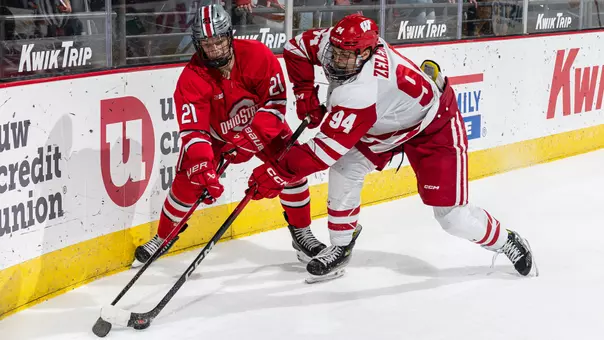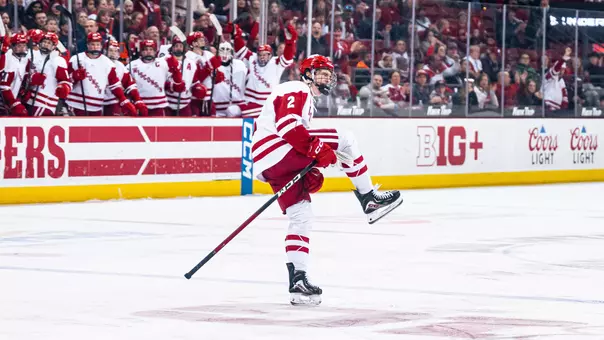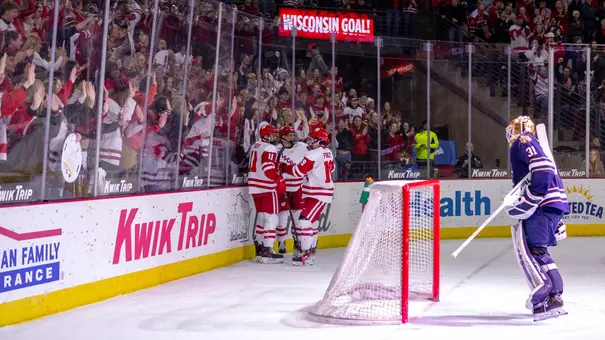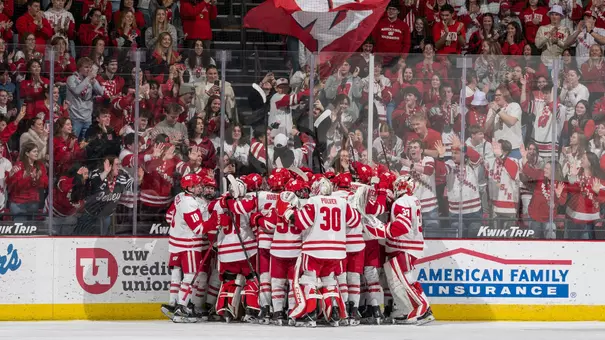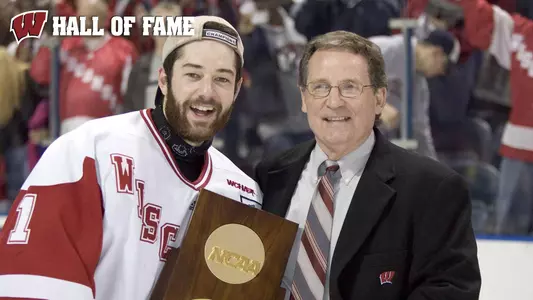
UW Athletic Hall of Fame 2019: Bill Howard
July 06, 2019 | General News, Men's Hockey, Andy Baggot
Pupils of Badgers’ goaltending coach netted six NCAA Championships and legacy for both UW and NHL
The 2019 class of the UW Athletic Hall of Fame has been selected and one new member will be announced each day from June 25 - July 6.
Visit UWBadgers.com each day to celebrate each new member of this distinguished and historic class of Badgers!
 |
||
|
MADISON, Wis. — Bill Howard has an unmatched legacy in the history of Wisconsin men's hockey.
He's the only person to possess all six NCAA championship rings, a distinctive feat made possible by his role as volunteer goaltending coach for the Badgers from 1972 to 2008.
The Badgers won national titles in 1973, '77, '81, '83, '90 and 2006. During that run Howard worked for three championship-winning head coaches — Bob Johnson, Jeff Sauer and Mike Eaves — toiled alongside 18 different assistant coaches and affected 1,457 games.
Howard tutored four first-team All-Americans, five first-team all-league performers and 11 team MVPs.
He instructed two Western Collegiate Hockey Association players of the year, two conference playoff MVPs and three league rookies of the year.
Howard produced three Olympians, seven NHL goaltenders and the only two-time Most Outstanding Player of the NCAA Frozen Four.
That resume helps explain why Howard is part of a 12-person class that will go into the University of Wisconsin Athletic Hall of Fame. The inductees will be honored at a banquet at Union South on Sept. 6 and be recognized at the football home opener at Camp Randall Stadium on Sept. 7.
"A great honor," he said.
Howard referenced all those aforementioned achievements when he was asked to define his legacy, but also offered this for consideration:
He's had a goaltender he tutored play in the NHL in the 1970s (Wayne Thomas), '80s (Marc Behrend, Curtis Joseph, Terry Kleisinger and Mike Richter), '90s (Joseph, Richter and Jim Carey), 2000s (Joseph, Richter and Brian Elliott) and the '10s (Elliott).
When Elliott signed a one-year contract with the Philadelphia Flyers last month, it seemingly added another decade to Howard's remarkable streak.
"That's a pretty good run," he said.
"That's remarkable," said Shane Connelly, a one-time pupil who now serves as director of hockey operations for the Wisconsin men's program. "Not too many guys are able to say that."
Howard grew up in Grand Forks, North Dakota, and played hockey and baseball at Colorado College. His coach in both sports was Johnson, who left to take the Wisconsin hockey job after Howard's junior year in 1966.
When Howard graduated with business and teaching degrees from CC in 1967, he got a call from Johnson imploring his former goaltender to come to Madison.
Johnson explained that a new high school, Memorial, had openings for teachers and coaches in baseball and hockey.
"I qualified for all those jobs," Howard said. "Coaching is something I wanted to try. It all fell into place."
Howard spent 10 years building the Memorial hockey program from scratch. His last two teams went undefeated and won Wisconsin Interscholastic Athletic Association state titles. It helped to have a scoring savant like Mark Johnson, Bob's son, as a go-to guy.
When Bob Johnson asked Howard to come work with the Wisconsin goaltenders in the early 1970s, it sparked an era of astonishing quality.
Thomas (1968 to '70) won a Stanley Cup with Montreal in 1973 and Richter (1985 to '87) did so with the New York Rangers in 1994. Meanwhile, Carey (1992 to '94) won the Vezina Trophy as the best goaltender in the NHL playing for Washington in 1996.
Julian Baretta (1975 to '79), Roy Schultz (1978 to '80), Bernd Bruckler (2001 to '05) and Elliott ('03 to '07) were selected as first-team All-Americans.
Behrend (1980 to '83) was the Most Outstanding Player in the 1981 and '83 NCAA Frozen Fours.
Richter, Behrend and Joseph (1988-89) were Olympians, while Thomas, Richter, Joseph and Elliott were NHL All-Star Game participants.
"We were really fortunate, once we got the ball rolling, that you got good athletes," Howard said.
All played in a system developed by Howard through trial and error and tweaked as crease sizes changed, rink dimensions grew and equipment evolved. Its technical bullet points are pretty simple, starting with patience and the ability to read the play in front of you.
"Don't beat yourself, play under control, don't give them a second shot," he said.
Howard said the best thing he ever did was make his own goaltending video in the early 1990s. Kirk Daubenspeck (1993 to '97) was the featured demonstrator before he became a second-team All-American in 1997. The project took six months to complete and gave way to an orderly step-by-step system.
"I got to analyze myself as a coach while I edited all these tapes and I found that I actually may be over-coaching," Howard said. "So I went back and I simplified it."
Goaltenders have long been seen as strange, quirky folk. How did Howard deal with that?
"They may have been 'out there' personality-wise, but once they got to the rink and I ran goalie practice, they were pretty focused," he said. "I never got into the other stuff.
"My goalie practices weren't easy. They were repetition, repetition, keep doing it till you do it right. Those that bought in did well."
Howard was asked to create the ideal goaltender using the best attributes of his Wisconsin understudies. He declined.
"That's pretty hard to do because each of them played at a different time," he said. "Each guy in their own way was pretty good."
Howard did allow that Elliott, whose .931 save percentage, 1.78 goals-against average and 16 shutouts are program records for a career, came closest to mastering his system.
"The one that knew it the best — it took him almost two full seasons to learn — was Elliott," Howard said.
Connelly was Elliot's backup for two seasons before compiling respectable career stats (41-36-11, 2.39 goals against, .913 save ratio, eight shutouts) from 2005 to '09. He was asked to describe how Howard taught his system.
"It was tough love," Connelly said. "At the time, sometimes you didn't understand it and you thought maybe he didn't like you. He was demanding and it was challenging because you almost didn't know where you stood with him at times."
But once Connelly became the starter, having put in his apprenticeship, Howard took a different approach.
"It was a little less kick in the (butt) and more patting you on the back and saying, 'You've got this. Don't worry about it,'" Connelly said.
Howard did more than volunteer his goaltending expertise. He also dispensed his hockey knowledge as a color analyst on local radio and statewide public TV.
"That was a bonus that was fun," said Howard, who was famously paired with Hall of Fame play-by-play man Paul Braun. "They needed somebody and each time I had to clear it with the coach. I don't think that any of the coaches I worked for really liked it.
"There were times when each of the coaches would say, 'You're telling them a little too much.' But it all worked out."
Howard, 75, never worked directly with the five-time NCAA champion women's program, but he helped create its goaltending legacy — Jessie McConnell, Alex Rigsby, Ann-Renee Desbiens, Kristen Campbell — nonetheless. The current position coach, Mark Greenhalgh, worked many of Howard's summertime goaltending camps.
Howard retired from teaching high school in 2001 and has "pretty much" stepped away from coaching young goaltenders. A recent exception is to work a couple days a week with the Madison Capitols, a Tier I entry in the U.S. Hockey League. He was happy to report that two understudies recently received college scholarships.
Howard has his six NCAA championship rings in a display case in his home. He used to wear them until "they got to be too gaudy."
He'll get another ring for being a Hall of Famer. This one he just might wear for a while.
"A great privilege," he said.
UW Athletic Hall of Fame Class of 2019
- Joe Thomas, Football
- Kelly (Kennedy) Saurer, Volleyball
- Otto Puls, Special Service
- Elzie Higginbottom, Track & Field
- Donovan Bergstrom, Cross Country and Track & Field
- Pat Christenson, Wrestling
- Gwen Jorgensen, Cross Country, Track & Field, Swimming
- Trent Jackson, Men's Basketball
- Jessie (Vetter) McConnell, Women's Hockey
- Jim Kalscheur, Special Service
- Ben Walter, Men's Golf
- Bill Howard, Men's Hockey

